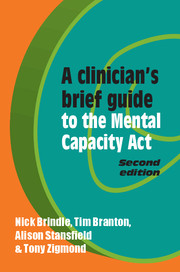Book contents
- Frontmatter
- Contents
- Preface
- Preface to the second edition
- Common abbreviations and terms
- 1 The legal framework: the Mental Capacity Act, the Human Rights Act and common law
- 2 The Mental Capacity Act and the authority to treat
- 3 Assessment of capacity
- 4 Best interests
- 5 Alternative authority – planning for the future
- 6 Independent Mental Capacity Advocates and regulation of research
- 7 Deprivation of Liberty Safeguards
- 8 The Court of Protection, clinically relevant judgments from the courts and writing reports
- 9 The Mental Health Act
- References
- Index
4 - Best interests
Published online by Cambridge University Press: 01 January 2018
- Frontmatter
- Contents
- Preface
- Preface to the second edition
- Common abbreviations and terms
- 1 The legal framework: the Mental Capacity Act, the Human Rights Act and common law
- 2 The Mental Capacity Act and the authority to treat
- 3 Assessment of capacity
- 4 Best interests
- 5 Alternative authority – planning for the future
- 6 Independent Mental Capacity Advocates and regulation of research
- 7 Deprivation of Liberty Safeguards
- 8 The Court of Protection, clinically relevant judgments from the courts and writing reports
- 9 The Mental Health Act
- References
- Index
Summary
Clinicians must almost always act in their patients’ best interests. The only exceptions are where the needs of others must take priority (e.g. because the patient presents a serious danger to someone else). What is in the patient's best interests, and how the clinician makes the decision, is usually a matter for discussion between doctor and patient. Sometimes only one course of action can be recommended. More commonly there are several options, with a balance between benefits and adverse effects. For the capacitous patient, the final decision is theirs unless they are subject to the Mental Health Act (see Chapter 9) or there is an overriding public interest. Having said that, it is important to remember that an adult patient who has decision-making capacity (and is not subject to the Mental Health Act) has an absolute right to refuse what you think is in their best interests. Also, doctors have a duty not to do anything that they think is not in their patient's best interests even if the patient wants it.
The MCA, while not defining best interests, sets out how clinicians should determine best interests for patients who lack the capacity to make decisions for themselves. Sometimes, as we discuss in Chapter 5, people plan for a time when they are not able to make decisions for themselves. However, this is unusual, and so the clinician's decisions have to be based on what they believe is in the patient's best interests.
The first question is who decides what is in the person's best interests? The MCA says the responsibility is that of the decision maker.
Who is the decision maker?
The ‘decision maker’ will vary depending on the person's circumstances and the decision that needs to be made. The decision maker is the individual who makes a decision for, or carries out an act on behalf of, a person who lacks capacity, and it is his or her responsibility to work out what would be in the best interests of that person. For day-to-day actions it will be the family member, informal or paid carer or nurse who is the decision maker. For medical treatment it will be the doctor or other professional who has responsibility.
- Type
- Chapter
- Information
- A Clinician's Brief Guide to the Mental Capacity Act , pp. 43 - 53Publisher: Royal College of PsychiatristsPrint publication year: 2015

